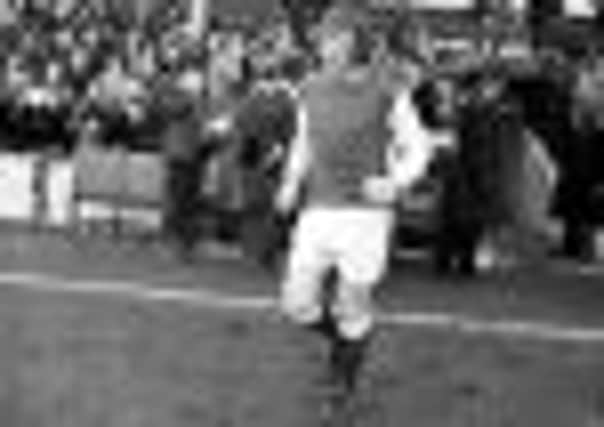Past five capital duels: Hearts 1 Hibs 2; 13th February 1971


Hibernian were possibly very narrow favourites when they made the short journey to Tynecastle Park on a February’s afternoon in 1971, to contest a second Scottish Cup meeting with their rivals in five years.
The clash came during Dave Ewing’s short reign at Easter Road as manager. It got off to a rousing start for the visitors, who hadn’t suffered defeat in Gorgie since the early Sixties, when John Hazel put them ahead after just 16 minutes.
Advertisement
Hide AdAdvertisement
Hide AdThe meeting came during a time when the sides were very evenly matched, save for one particularly eye-opening result. “It was very much a case of who was better on the day in those days,” recalls John Blackley.
Indeed, they finished that season within three points of each other – Hearts in 11th place, and Hibs in 12th. The previous campaign had seen Hibs finish just above Hearts in third place, with their rivals six points behind in fourth. Incredibly, even when they took part in this particular clash, they were jostling for position with one another – Hibs were in seventh place and Hearts in eighth, just a point behind.
Blackley, who made over 250 appearances during two spells at Easter Road, remembers Hibs being a good team beginning to blossom into possibly a great one. He was one of the younger members of a side supplemented by the experience of the returning Joe Baker, who had left Hibs to join Torino ten years earlier.
“Joe Baker had just come back and he was the elder statesman,” recalled Blackley. “He was a wonderful man and a wonderful player, even at the age he was. And he was still a really good player. He was still the quickest we had over five or ten yards. It was a privilege to play with people like him.”
“You also had the likes of Pat Stanton,” he added. “Not only was he a great player, but he was a great leader. You had Arthur Duncan, who was coming to the fore – he was exceptional. And a young John Brownlie on the other side. It was a team in the making, and then the younger ones came in – [Alex] Cropley, and such like. It was an important time in the club’s history – and it is always important against your rivals.”
Hazel, one of three 18-year-olds in the Hibs side, got the team off to a flyer with his first goal for the club. “He left Hibs too early, he was a good player,” recalled Blackley with reference to Hazel, who signed for Morton in 1973. “I don’t know if he got kind of lost because of the other players who were coming in at the time. It was a Hibs team forming. We didn’t know it at the time. There were also younger boys coming through the ranks. It was the start of something.”
The unheralded Dave Ewing – although born in Perthshire, he spent his entire playing career in England – was manager at this time, while across the city it was Bob Seith. Ewing, a brawny gentleman whose claim to fame had been scoring ten own goals when at Manchester City, demanded a high level of fitness from his players – and they were not minded to argue with him. “He believed the key to success was being able to run all day,” says Blackley. “We did a lot of running in training and were a fit group of lads. He [Ewing] was a nice man and got his ideas across well.”
Kevin Hegarty equalised for Hearts in the second half before Arthur Duncan, who grew up near to Blackley in Falkirk, took over, giving his side victory after a solo run from near the half-way line, for which he needed to call on all the physical conditioning worked on in training as he slalomed past David Clunie and Alan Anderson before converting from a narrow angle. It was a goal fit to win any derby and it simply deepened the Hearts fans’ anguish. Not since September 1963 had they seen their team triumph over Hibs in the league in Gorgie.
Advertisement
Hide AdAdvertisement
Hide Ad“I liked Tynecastle, mainly because I liked playing where there was an atmosphere,” says Blackley. “It was similar to Ibrox and Celtic Park. And we knew how important the derby game was to the Edinburgh people – it was very special.”
Hibs had beaten Forfar Athletic 8-1 in the previous round and went on to defeat Dundee in the quarter-finals, booking a semi-final appointment with Rangers in the process. The cup final eluded them, however. Hibs were beaten 2-1 by the Ibrox side in the replay, after the original game finished 0-0.
“There was always a feeling that you could go on to win it,” said Blackley, dismissing talk of a hoodoo which, back then, was only a mere 70-odd years’ standing.
“If you could get the big two [Rangers and Celtic] on a day when they were down a bit and every one of our players turned up, then you could beat them,” added Blackley, who was playing when Hibs got Celtic on a wrong day the following year in the Scottish Cup final, losing 6-1.
“There was always a fear factor you would get them at the wrong time.
“We always used to get Rangers at the semi-finals and we used to beat them – except on this occasion when they beat us.”
Other great days were to come, including a League Cup final victory the following year over Celtic and a 7-0 win at Tynecastle still talked about to this day.